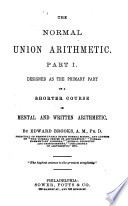 | Edward Brooks - Arithmetic - 1878 - 164 pages
...not chauge its value. Hence the following PRINCIPLE V. — Multiplying both numerator and denominator of a fraction by the same number does not change the value of the fraction. Multiply both numerator and denominator of 2. f by 3. 3. f by 5. 4. | by.6. 5. Л... | |
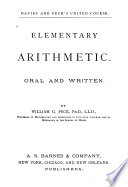 | William Guy Peck - Arithmetic - 1878 - 240 pages
...of a fraction by any number is equivalent to multiplying the fraction by that number. 5. Multiplying both terms of a fraction by the same number does not change tJie value of the fraction. What is a proper fraction? What is an improper fraction? What is the value... | |
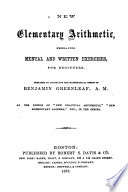 | Benjamin Greenleaf - Arithmetic - 1879 - 238 pages
...to the divisor. Thus, the quotient of 1 divided by 2 is 4 ; 3 divided by 4 is | ; and •§ is 2. 2. Dividing both terms of a fraction by the same number does not change its value. For it has been shown, that canceling equal factors in the dividend and divisor does not... | |
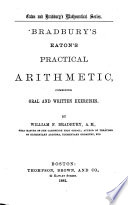 | William Frothingham Bradbury - 1882 - 416 pages
...in the value of the fraction. (Art. 79.) (c.) Multiplying or dividing both numerator and denominator of a fraction by the same number does not change the value of the fraction. (Art. 80.) 119. A Proper Fraction is one whose numerator is less than the denominator... | |
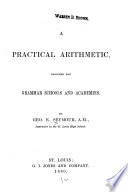 | George E. Seymour - Arithmetic - 1880 - 332 pages
...denominator divides the fraction. Hence, the value of the fraction remains unchanged. Sixth Principle. 131. Dividing both terms of a fraction by the same number does not change its value. DEMONSTRATION . Dividing the numerator divides the value of the fraction as many times as... | |
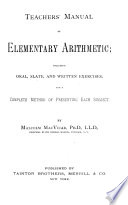 | Malcolm MacVicar - Arithmetic - 1880 - 268 pages
...fourths ; if to fifths; TV to halves. 4. PRINCIPLE. — Dividing both the numerator and denominator of a fraction by the same number does not change the value of the fraction. 5. How many thirds in $ ? In $ ? In }f ? In ^ ? 6. Change £ and TV each to fourths,... | |
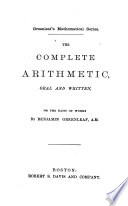 | Henry Bartlett Maglathlin - Arithmetic - 1881 - 418 pages
...one fourth as large, so that the value of the fraction is not changed. 111. Principle. Multiplying both terms of a fraction by the same number does not change its value. 27. Change to 12ths i, $, i, J, §, f , f. 28. Change to I8tha i, i, J, J, f, f, fff, f.... | |
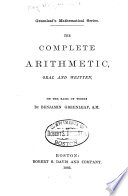 | Henry Bartlett Maglathlin - Arithmetic - 1882 - 398 pages
...their number is a fourth as large, so that the value of the fraction is not changed. 114. Principle. Dividing both terms of a fraction by the same number does not change its value. Change to smallest terms : AA. 2434 Ft _8 -9 l_i> _3_ 4 **• f ' f> F- f, Tff' TS> T2,... | |
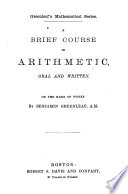 | Henry Bartlett Maglathlin - Arithmetic - 1882 - 212 pages
...of both terms making the size of the equal parts larger, while it makes their number smaller. 150. Dividing both terms of a fraction by the same number does not change its value. 17. Change ^f£ to smallest terms. Solution. — Dividing 5 ) 105 _ 3 ) 21 _ 7 . both terms... | |
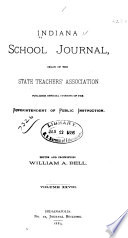 | Education - 1883 - 940 pages
....00000375 300.00000075 3. a. (25 — l6)* = 3. b. (I2j — SJX 8) = 34. f- 34X3=I°24. a. As multiplying both terms of a fraction by the same number does not change the relation between the value of the parts into which the unit is divided, and the number of the parts... | |
| |